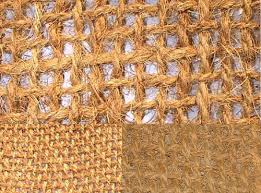Natural Fibers for Technical Textile Applications
Natural fibers in technical applications
Coir, Jute, Flax in Industrial Textiles
In the other product we can see paper industry. To produce paper pulps commonly used vegetable fibers such as cotton and lien. Absorbency properties are very important when producing pulp and even consuming because papers are use to print letters, pictures, etc hence it is essential to proper absorbency of inks. Another products of coir fibers can be given brushes and brooms formation. And Coir, Jute flax fibers are used with different functions, performance and decorative based applications in the world.
Coir, Jute, Flax in Industrial Textiles
Before invention
synthetic and regenerated fibers, human used natural fibers for various textile
applications. But even today people use natural fiber based textiles to perform
different needs and wants. Especially Natural fibers are used to create
technical textiles. And those technical textiles are used in different
industries such as agriculture, building construction, medical purposes, geo
applications, home applications, etc. As natural fibers that we can see various
types but widely used Coir fibers, Jute fibers, and Flax fibers
as raw materials for technical textile applications. These fibers have specific
properties and characteristics therefore we will look what they are and how
they applied to technical textiles applications.
·
Origin
from Nature - Natural fibers is founded from
natural environment. There are renewable sources. Coir fiber is extracted from
coconut husk. Flax fiber extracted from bast of flax plant. And also Jute fiber
also extracted from stem of jute plant. Those extraction processes are
environment friendly and all these fibers have cellulose based chemical
structure. This structure based properties help to increase function and
performance of final product.
·
Aesthetic
& Decorative Purposes- Commonly jute fiber based
applications are used even aesthetic and decorative purposes. The best examples
are jute screens and jute carpets in the home applications. These jute carpets
that we can see in different colours and different designs in the market.
·
Mechanical
Properties- Natural fibers have good heat
resistance, high strength, high yield, and toughness properties. Those above
points are very important when producing technical applications. For example in
the producing packing textiles used Coir and flax fibers because of high
strength. Another example is sometimes coir fibers are mixed with concretes in
the buildings foundations and ground area to increase strength and prevent from
cracking cements due to heat, and vibrations. Another example I can explain
coir fiber used to produce cordages and ropes because coir fiber has higher
strength helps to preventing break cordage. As well as flax fibers are used also
for sails, tent fabrics, table and bed linens.
·
Biodegradable Properties – All we know
synthetic polymers are not quickly decayed and take thousand years to decay.
But vegetable fibers are environment friendly and decay it is very important
because after consumption product it is easy to recycle, it is naturally
recycling and not harmful to environment. For example we can give coir, flax
packing materials.
In the other product we can see paper industry. To produce paper pulps commonly used vegetable fibers such as cotton and lien. Absorbency properties are very important when producing pulp and even consuming because papers are use to print letters, pictures, etc hence it is essential to proper absorbency of inks. Another products of coir fibers can be given brushes and brooms formation. And Coir, Jute flax fibers are used with different functions, performance and decorative based applications in the world.
